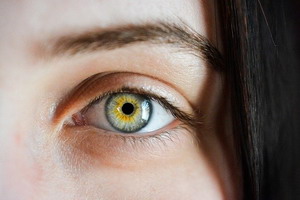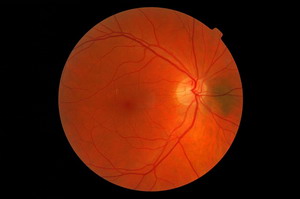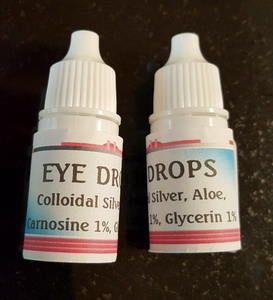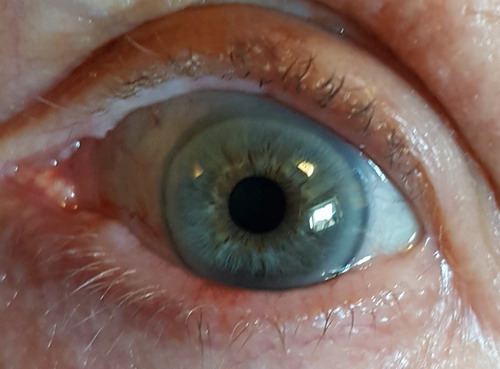I asked my sister yesterday for a newsletter

subject matter idea. She is the one who edits my newsletters as she actually knows where to put commas and other written communication etiquette. It’s really nice she allows me to keep my voice even though it’s grammatically foolhardy. In any case, she suggested eye health. I searched through all my newsletters over the last seven years and was astounded that I had not already written such a piece. I really like having eyes. They are really useful and very worthy of being taken care of.
One might ask, “Why would a chiropractor write anything about eyes?” Do you remember your very first visit with me when I checked your balance by having you close your eyes? I did that because so much of your posture and muscle action is controlled by the eyes. There are actually nerve fibers that go from your eyes directly to the muscle control centers of the brain without any processing beforehand. A ton more nerves go to control motor areas of the brain after the visual centers of your brain process the imagery and make sense of it. But some reflexes need to be so fast that the body needs instant

communication from the eyes to the body. At times your eyes literally control your body, not your mind.
So even though my focus is on how well your joints move and muscles function, I also attend to everything that impacts that functioning such as nutrition, neurology, organ function, and sensory functioning – such as the eyes, ears, and kinesthetic senses. I don’t pay much attention to the sense of taste and smell other than as the earliest warning sign of dementia.
Eyes are important, therefore care for our eyes is important. Ellen and I go regularly to the optometrist to have our eyes checked, which includes wide-field pictures of the inside of the eye (the retina) as many systemic diseases can be caught early by examining the blood vessels in the retina. The eyes give you a window into the inner life of the blood vessels in your body without having to cut into you to see them. Everything

that affects the vessels elsewhere in your body also affects retinal vessels so they reflect disease processes happening systemically in your body.
Let’s start with nutrition for the care of your eyes. As just mentioned, the health of your eyes is directly tied to the health of all the vessels in your body. So along those lines, you want to avoid smoking, air pollution, excess drinking, sugar and simple carbs (avoid high blood sugar), trans fats, rancid oils (which is virtually any and all vegetable and seed oils), and anything that promotes excess oxidation with free radicals like chemicals in cleaning products, personal hygiene products, and food chemicals. On the good side, you want to have a diet rich in high antioxidant vegetables, herbs, spices, and fruits. You want your proteins raised clean in fresh air and sunshine without pesticides, growth hormones, or GMOs. The way I worded that applies to both carnivore and

vegetarian proteins. You want to make sure that you digest your food well and completely and leave a minimum of 12 – 16 hours without food each day (usually while you sleep) to allow your liver to detoxify your system.
Specific eye nutrients are:
Zinc – 80 mg/day red meat, seafood, poultry, beans, yeast, nuts
Copper – 2 mg/day shellfish, mushrooms, tofu, sweet potatoes, nuts
Vitamin C – 500 mg/day citrus, leafy greens, eggs, vegetables
Vitamin E – 400 IU/day nuts, seeds, avocados, eggs, seafood
Vitamin A – 3000 IU/day carrots, eggs, liver, butter, cheese, seafood
Omega 3 – 3 gm/day oily fish, krill, nuts, seeds
Lutein 10 mg/day leafy greens, eggs, peas, citrus, sweet corn, celery
Zeaxanthin 2 mg/day leafy greens, eggs, peas, citrus, sweet corn, celery
The absorption of lutein and zeaxanthin is greatly enhanced by consuming them with healthy oils like olive, coconut, or avocado. Eye health foods are largely the same foods that are healthy for all of the body. The eyes have a special liking for the bright colored pigments lutein and zeaxanthin found in fruits and vegetables, which help prevent age-related macular degeneration and cataracts. Fortunately, since most people do not eat enough leafy green vegetables, supplements of these pigments have been found to work well without

side effects. Omega 3 fish oil supplements don’t seem to produce the benefits that consuming actual fish produces. This may be due to the way the omega 3 oil is extracted from the fish. Krill oil omega 3 supplements don’t suffer from those extraction method issues. The ability of the body to absorb and convert vegetable sources of the provitamin beta carotene into vitamin A varies greatly with the individual and the diet mix. On average it is reported that for every 12 IU of beta carotene consumed the body ends up with 1IU of actual vitamin A. Similar problems exist in our ability to convert the vegetarian sources of omega 3 into the forms we can use. Some studies say that pregnant women can convert 8% of the plant omega 3 – alpha-linolenic IU acid (ALA) – while men can’t convert it at all. So vegetarians need to be aware of these limitations and supplement accordingly.
So how real are eyesight problems due to nutrient deficiency? Every year one quarter to one half a million children go blind due to vitamin A deficiency. What is the first symptom – dry skin and dry eyes. How many of you use eye drops for dry eyes? How many of you know someone with macular degeneration? Lutein and zeaxanthin are well known to greatly reduce the incidence of this disease. Eating a diet full of good organic vegetables and fruits, pastured eggs, clean proteins, healthy nuts, and seeds just makes sense to protect our eyes.
What else do we need to attend to? Too much

time staring at a computer screen strains the eyes in several ways. Repeatedly focusing your eyes at the same distance tires out those muscles. Our eyes are designed to constantly scan the environment, both close and far away, looking for food and predators. Every 20 minutes focus your eyes on something far away for at least 20 seconds to fight this fatigue. Even more important is that when we stay focused on a computer screen our rate of blinking reduces considerably. This is very significant because the cornea, the clear area over the center of your eye, has no blood vessels. All the oxygen and nutrients these tissues need to survive are dissolved in your tears and carried to the corneal cells when you blink. If you do not blink enough these cells literally starve. This is part of what sets you up for cataracts later.
The cells of your cornea grow and replace themselves very quickly. Fast-growing cells anywhere are very sensitive to radiation damage. The most common radiation that hits your eyes is high energy ultraviolet light. Too much exposure

to this in sunlight, particularly if your nutrition is marginal, also leads to cataracts. This high energy light oxidizes the cell membranes. This is where the antioxidant benefits of the vitamins A, C, E, plus lutein and zeaxanthin critically come into play in preventing cataracts.
A couple of years ago I created an anti-inflammatory antioxidant eye drop for Ellen and myself to help with dry eyes and to fight cataracts before they get started. I base it in colloidal silver, aloe vera, glycerin, and N-acetylcarnosine. Several studies have shown the N-acetylcarnosine to be especially good at not only stopping cataracts but actually reversing them. Glycerin is what is used in most moisturizing eye drops. Aloe vera is a wonderful anti-inflammatory

that I used to be able to get as an eye drop from a company that now no longer exists. Colloidal silver is good at killing unwanted bacteria while being safe for human tissues. It is a pain to make because I have to super filter it to make sure it is pure enough to put in the eye, but I still have it available in the office.
Your eyes are delicate and precious. Wear eye protection when you are working in an environment where dust and debris might get into them. Stuff you get on your hands does not belong in your eyes, so be careful with rubbing your eyes. Be aware that eye makeup often serves as a carrier for many types of bacteria, so think twice before you use that leftover makeup in your bag from last year. The tissues around your eyes are very sensitive to chemicals, even plant extracts, and essential oils, so be careful. Your eye muscles need good quality sleep every night, so staying up to all hours watching youtube is a bad choice for eye health. Your eyes need fresh air, but don’t like overly dehumidified air – it dries

them out. Pay attention to the quality and quantity of your tears. If you are not producing enough tears to keep your eyeball nourished ( a warning sign for vitamin A deficiency) then use eye drops in the short run while you figure out why the tear production is decreased and fix it.
I have just touched on the simple stuff we can do ourselves to keep our eyes healthy. There is a ton of stuff that eye doctors have to be aware of in looking for eye diseases. My best advice there is to have your eyes checked by a qualified

professional every year just because. It is like going to the dentist for regular checkups. Protect your eyes. They really are precious.
Take care,
David
